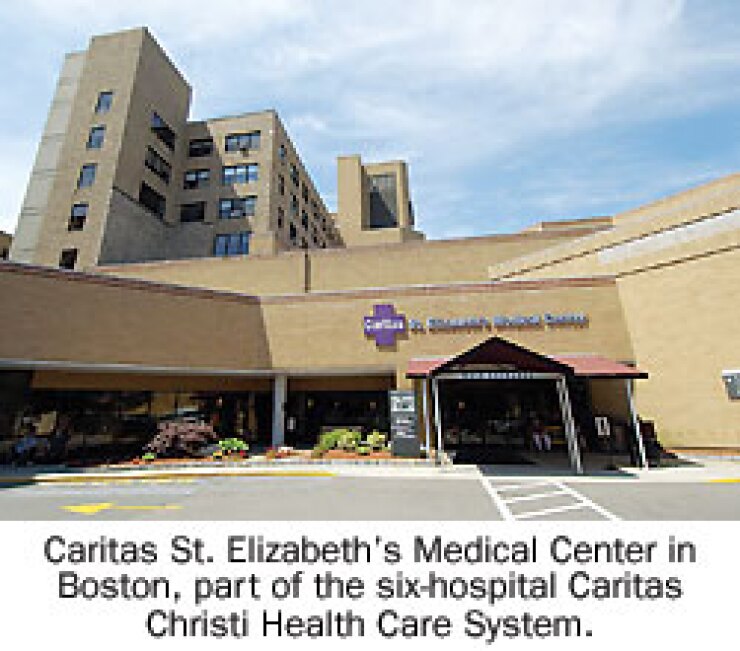
CHICAGO — Private-equity group Cerberus Capital Management LP yesterday said it would buy Boston’s nonprofit Caritas Christi Health Care for $830 million, taking over the Catholic system’s long-term debt and spending $400 million on capital upgrades.
The deal needs approval from the Massachusetts attorney general, which will make a recommendation to the Massachusetts Supreme Judicial Court, whose approval is needed for the charitable hospital to become a for-profit entity.
The Massachusetts Department of Public Health and the Archbishop of Boston also need to sign off on the proposal. Caritas is the second-largest hospital group in the state.
The announcement comes several days after another for-profit outfit announced a plan to take over a struggling, urban nonprofit hospital system, and three days after President Obama signed into law an overhaul of the country’s health care system.
Last Friday, Tennessee-based for-profit Vanguard Health Systems Inc. announced its intention to buy Detroit Medical Center — Michigan’s largest charity-care provider — for $417 million plus an additional $850 million for capital improvements.
The interest in the systems could be driven by the new federal law, said market participants.
“The fact that these two hospitals, which have struggled over the years and are situated in markets with lower incomes and higher uninsured patients, are targets of takeovers suggests [private companies] are looking at these types of systems as being beneficiaries under the new rules,” said Richard Ciccarone, head of municipal research at McDonnell Investment Management.
For-profit companies are “looking at areas for improvement of potential profitability because of wider insurance penetration,” Ciccarone said.
In both deals, the new owners would need to either retire all outstanding tax-exempt bonds or refinance it into taxable debt as the transactions would change the systems’ status to for-profit from nonprofit.
As of Nov. 30, 2009, Caritas had $243.9 million of outstanding bonds. As part of the transaction, Cerberus would either defease the bonds or refinance them into taxable debt — either way, the bondholders will be repaid, said Robert Fraiman, president and chief executive officer of Cain Brothers & Co., financial adviser to Caritas.
“From the perspective of the current debt holders, the expectation is that they will be repaid — the methods for doing that have not yet been fully determined,” Fraiman said. “This is a transaction that will take many months to reach closing because there are quite a few approvals that are required.”
It would be the first hospital acquisition for Cerberus, a private-equity group best known for its acquisition of Chrysler. The firm has said it is considering expanding Caritas and buying other hospitals across the country, according to reports.
Under the deal, Cerberus said it would maintain all 13,000 employees as well as the system’s current management team and its Boston headquarters. The firm also said Caritas would retain its Catholic identity and existing community-benefit policies.
A Catholic health care system that operates six acute-care hospitals throughout eastern Massachusetts, Caritas spent years struggling financially before beginning to see positive earnings starting four years ago.
Last year, Caritas, working with Cain Brothers, implemented a number of strategies to improve the system, including layoffs, the sale of a medical lab, and changes to its pension plan.
The restructuring increased profitability and prompted Moody’s Investors Service to boost its rating on the system’s debt to Baa2 from Baa3 and Standard & Poor’s to revise its outlook to positive from negative and affirm its BBB rating. Standard & Poor’s yesterday said its rating on Caritas’ debt is unaffected by the pending acquisition. If the bonds are defeased, the agency said it would withdraw its rating.
Cerberus and Vanguard are both taking over systems that are faced with aging structures in need of major capital improvements. The average age of a facility at DMC is 19.1 years and 15.3 years at Caritas — both significantly higher than the national average median age of 10.1, Ciccarone pointed out.
“They’re going to have a big transition period,” he said. “Someone is going to need deep pockets to get through that transition.”
Caritas reportedly had planned to issue roughly $100 million of new-money debt this year for capital projects and had also estimated that annual depreciation expenses total $50 million, according to a November 2009 report from Standard & Poor’s.
Caritas issued $197.7 million of bonds in 1999 through the Massachusetts Health and Educational Facilities Authority. The debt featured maturity dates from 2000 through 2039, with the largest chunks maturing in 2015 and 2020. The system sold $113.6 million of bonds in 2002. That debt had maturity dates from 2003 through 2031.
Credit analysts have noted that much of Caritas’ debt matures through 2015, and that the system had considered refinancing some of the debt this year to smooth out debt service. The system has no interest-rate swaps.





